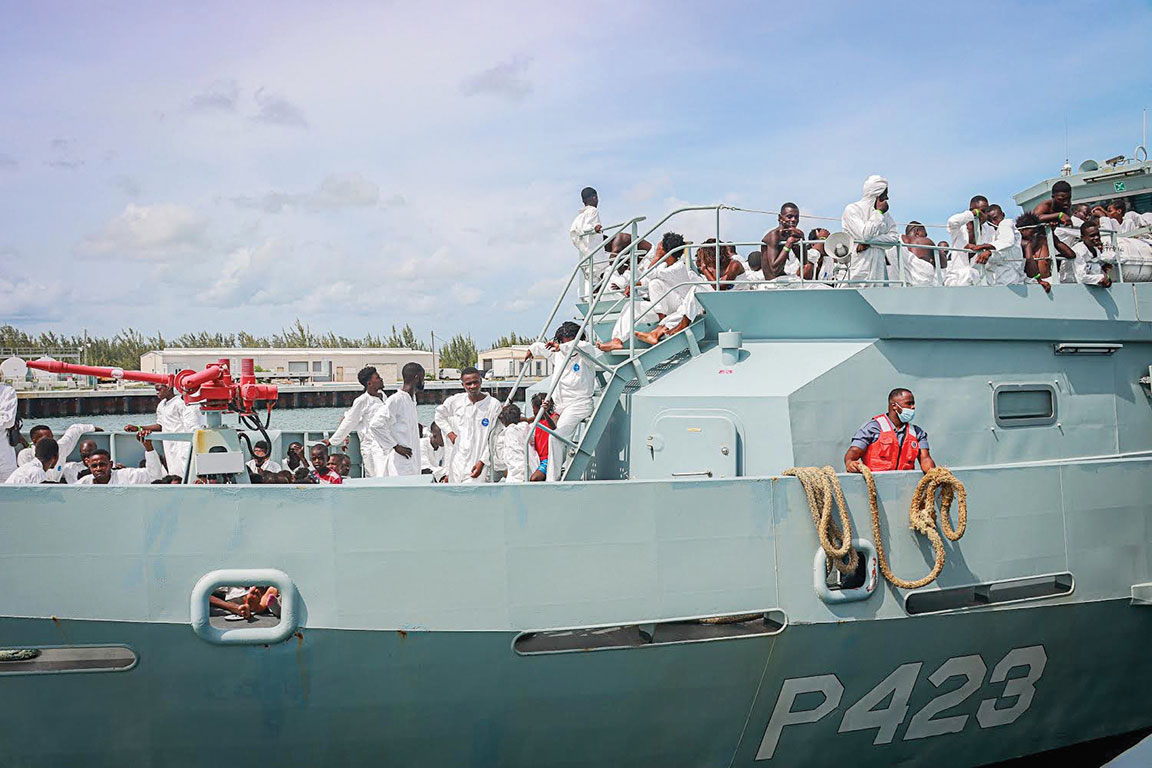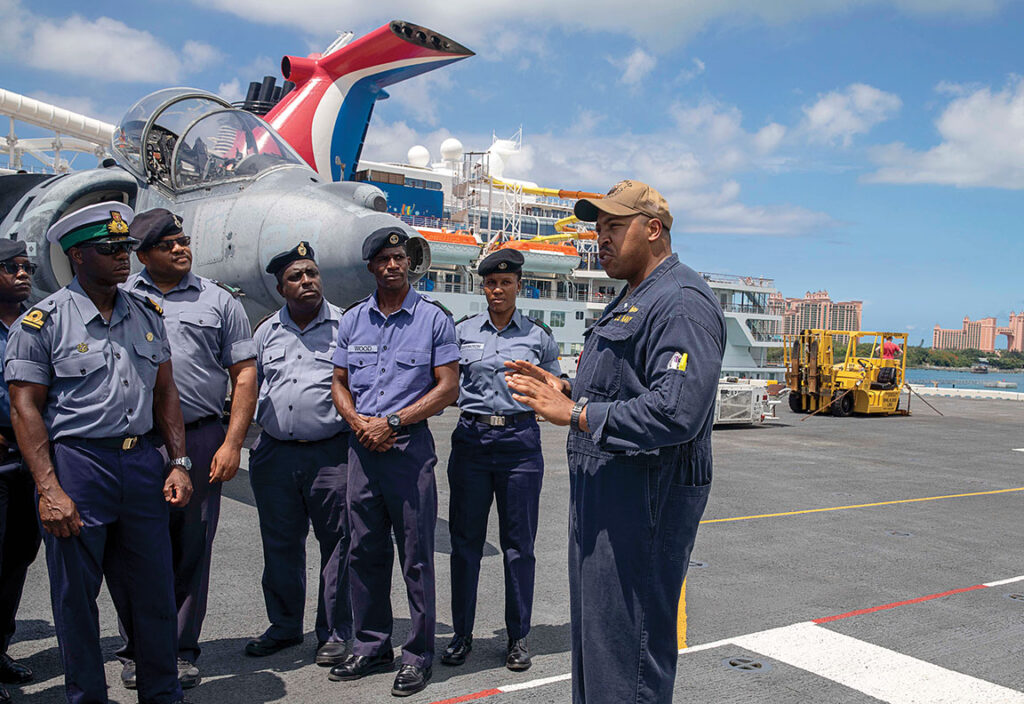U.S. Navy Lt. j.g. Victor Cooper gives members of the Royal Bahamas Defence Force a tour of the USS Wasp when it visited Nassau in June 2023. PETTY OFFICER 3RD CLASS ERIC MOSER/U.S. NAVY
JOEL PEDERSEN/U.S. NORTHERN COMMAND
Cooperation between the U.S. Department of Defense (DOD) and the Bahamas supports the development of maritime security throughout the Bahamas’ archipelago of 700 islands and cays and 466,000 square kilometers of ocean.
The strategic goal is for the Royal Bahamas Defence Force (RBDF) to become interoperable with the U.S. military and capable of sharing information and intelligence on security threats to protect North America. This includes three main objectives: 1) Integrate a near real-time operational picture of sovereign territory and approaches to detect, identify, track and share information and intelligence on potential threats. 2) Strengthen interoperability to conduct joint and combined interdiction operations. 3) Establish institutional capability to identify, prioritize and resource sustained strategic security and defense capabilities and improve readiness.
USNORTHCOM and the RBDF developed the Bilateral Security Cooperation Framework to synchronize security cooperation with the RBDF and allow senior leaders to build relationships and provide multiyear oversight and guidance. The most recent annual meeting was held in April 2024 in Rhode Island.
The framework is modeled after the successful USNORTHCOM Mexico Bilateral Military Cooperation Roundtable, which synchronizes security cooperation with the Mexican military and provides senior leaders with a recurring forum for oversight and engagement. The relationship with the RBDF has matured to the point where a roundtable-like forum benefits both militaries.

In an October 2023 interview, Commodore Raymond E. King of the RBDF described the framework as a “lifesaver” for identifying areas of mutual interest. “The first effort is our maritime domain awareness, where we are seeking to strengthen certain capabilities, intelligence, cybersecurity and communications,” King told Diálogo Americas, a publication of U.S. Southern Command (USSOUTHCOM). “We also have efforts that deal with maritime domain control, where we’re getting assistance with our decentralization program, being equipped with the necessary technology to ensure that we can maintain awareness of who is in our domain.
“The third one has to do with institutional capacity building, where we’re seeking to professionalize the RBDF to ensure that our structure is designed based on a force design, structure, objectives and capabilities we need to accomplish our mission. The fourth one has to do with subject matter expert exchanges with mobile training teams coming to the Bahamas to conduct them.”
Key components of the framework include:
- Integration with USNORTHCOM: The framework mirrors the successful USNORTHCOM-Mexico partnership. Regular meetings, including the session in April 2024, are instrumental in driving this collaboration.
- Counteracting Strategic Competitors’ Influence: An ancillary focus is to counter strategic competitors’ growing influence in the region, especially after Hurricane Dorian and the COVID-19 pandemic.
- Maritime Surveillance System Radars: The installation of radars across the archipelago significantly enhances maritime domain awareness and bolsters defenses against illicit activities.
- Coordination with USSOUTHCOM: The RBDF has effectively coordinated with USSOUTHCOM for multiple missions, including a significant contribution to a United Nations mission in Haiti in 2024.
- Military Equipment and Training: The signing of letters of request for tactical vehicles, weapons and supplies exemplifies the DOD’s support in equipping the RBDF. Training and capacity-building initiatives are also ongoing.
- Strategic and Human Resource Management: The Defense Security Cooperation University’s Institute for Security Governance assists in comprehensive strategy development and force management for the RBDF and the Ministry of National Security.
- Military Justice and Ethics: Development of a military justice system and an ethics policy is underway, ensuring compliance with international standards and enhancing operational integrity.
- Policy and Procedure Development: Formalizing maritime security policies and procedures is critical for operational effectiveness and legal compliance.
- Cybersecurity and Intelligence: Establishing robust cybersecurity capabilities and improving intelligence procedures are essential. Increased information and intelligence sharing with regional partners is a focus area.
Domain Control Improvement: Efforts to expand maritime operations, strengthen regional command structures, enhance interdiction capabilities and improve search and rescue operations are in progress.
Institutional Capacity Building: Long-term initiatives aim to strengthen the institutional capacity of the RBDF, its leadership and the Ministry of National Security.
The partnership under the bilateral framework is a testament to the commitment of the DOD and RBDF in securing the Bahamas’ maritime domain, countering external influences and strengthening regional security. Through continuous collaboration and strategic developments, this alliance aims to achieve a more secure and resilient maritime environment in the region.

